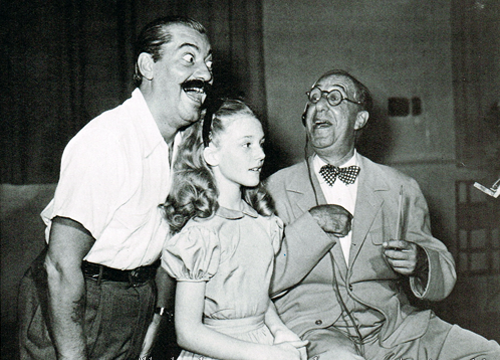There’s something extremely appropriate about the fact that Jerry Colonna’s final screen performance was on an episode of The Monkees. Sadly, this is mostly because he had a stroke that sidelined him for two decades, but at least he went out on something worthy of his talents. Colonna was a powerhouse of entertainment—so funny that he was shifted from being a musician to a comedian if anything to keep the musicians from breaking up—and someone who isn’t really remembered for his very real talents as much as he should be and more of a pop culture footnote. In short, ideal fodder for this column.
While it’s not impossible for people to have a mental image of Colonna, as he did do live action performing in movies—and one of the oldest surviving television kinescopes, and of course that Monkees episode—it’s his voice that is most familiar to audiences. That was always true; he got his start in radio. He worked with any number of the greats, even in those early days. He was discovered on the same radio show that gave us Spike Jones—with whom he worked—and Victor Borge. He worked with Bob Hope, including on Hope’s USO tours.
This led to Colonna’s appearance in three of the Road movies with Hope and Bing Crosby, on whose show Colonna had been discovered in the first place. Probably his casting in the Disney movies he made had to do with the distinctive radio work he’d done. Can anyone these days say they hear “Casey at the Bat” or “Casey Jones” in any voice other than his? And if his March Hare isn’t exactly Carroll-authentic, it’s the definitive version now, anyway.
Colonna is also one of the frequent figures of parody from the cartoons of the ‘40s. Many of us were used to pop culture references that were out of date before our parents were born (well, not my dad, who was born in ‘38, but you know) from our cartoons. Colonna is one of the handful who hung on, mostly because we knew his actual voice from Disney, but the visuals and catchphrases were foreign to us. Unlike my parents’ childhood television, their childhood radio didn’t have the same longstanding familiarity, as few of us listened to old radio—and what we did was more likely to have Orson Welles than Jerry Colonna.
Still, his influence is felt in comedy today, and if his specific variety of Italian stereotype doesn’t have the same legs it did in the ‘40s, well, people don’t even necessarily recognize it as such when they hear his voice. Colonna was one of the greats of the ‘40s, hung on until the ‘60s, dies in the ‘80s, and even now, nearly forty years after his death, is well remembered and needs to be made a Disney Legend, like, yesterday. Because he is, whether he’s officially remembered as such by the studio or not.

